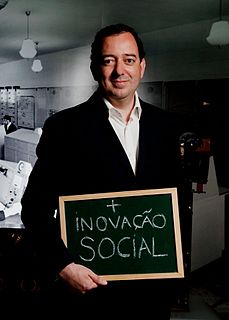A Quote by Nick Hanauer
Prosperity in human society is misunderstood. The difference between a rich and poor society is the number of problems that society solves for its citizens. That means technological innovation is the source of all prosperity, but with every tech innovation, you also get disruption - ultimately, social and civic disruption.
Related Quotes
Democracy is disruptive. Around the world, peaceful protesters are being demonised for this, but there is no right in a democratic civil society to be free of disruption. Protesters ideally should read Gandhi and King and dedicate themselves to disciplined, long-term, non-violent disruption of business as usual - especially disruption of traffic.
We might expect intelligent life and technological communities to have emerged in the universe billions of years ago. Given that human society is only a few thousand years old, and that human technological society is mere centuries old, the nature of a community with millions or even billions of years of technological and social progress cannot even be imagined. ... What would we make of a billion-year-old technological community?
In the eighties and nineties, the innovation agenda was exclusively focused on enterprises. There was a time in which economic and social issues were seen as separate. Economy was producing wealth, society was spending. In the 21st century economy, this is not true anymore. Sectors like health, social services and education have a tendency to grow, in GDP percentage as well as in creating employment, whereas other industries are decreasing. In the long term, an innovation in social services or education will be as important as an innovation in the pharmaceutical or aerospatial industry.
A dreaded society is not a civilized society. The most progressive and powerful society in the civilized sense, is a society which has recognized its ethos, and come to terms with the past and the present, with religion and science. With modernism and mysticism, with materialism and spirituality; a society free of tension, a society rich in culture. Such a society cannot come with hocus-pocus formulas and with fraud. It has to flow from the depth of a divine search.
But there is nothing idealized or romantic about the difference between a society whose arrangements roughly serve all its citizens (something otherwise known as social justice) and one whose institutions have been converted into a stupendous fraud. That can be the difference between democracy and plutocracy.


































